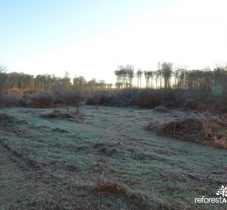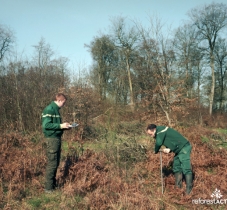Project description
Participate in the planting of hardwoods in a massif that does not naturally regenerate in the Villecartier forest.
The project at a glance
- Number of trees to be planted: 4,200
- Planting area: 14.3 hectares
- Species planted: oak, chestnut tree, birch tree
- Type of project: planting on regeneration gaps
- Planting season: December 2018
Context and benefits
A former royal forest covering an area of 1,000 hectares, the Villecartier forest in Bazouges-la-Pérouse is mainly composed of beech and oak trees. Since 1999, it has been experiencing problems of natural regeneration, with a low frequency of sowing (natural sowing of beech). Natural regeneration on plots 48 and 52 was not entirely satisfactory; many gaps remain without natural seedling. A replenishment of the stand with planting must be undertaken to fill the gaps.
To anticipate the global warming process that would induce weather conditions less favourable for beech development, the seedlings are supplemented by chestnut, birch and sessile oak plants. These latter species are better adapted to regular dry periods in summer. Forest management emphasizes that global warming with negative beech models encourages the avoidance of pure stands by recommending mixing with other species.



